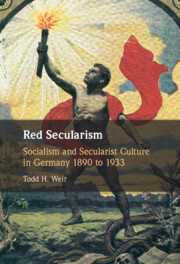Book contents
- Red Secularism
- Red Secularism
- Copyright page
- Contents
- Figures
- Tables
- Preface
- Abbreviations
- 1 Introducing Socialism and Secularism as Two Cultures
- 2 Secularist Culture in an Industrializing City
- 3 Prometheans
- 4 The Sociology and Psychology of Secularist Intellectuals
- 5 Workers and Worldview
- 6 The Politics of Secularism 1905–1914
- 7 Secularists in War and Revolution 1914–1922
- 8 Monism in the Weimar Workers’ Culture Movement
- 9 Culture War at the End of the Weimar Republic
- Epilogue
- Appendixes
- Archives Used
- Index
3 - Prometheans
Secularist Intellectuals on the Socialist Stage
Published online by Cambridge University Press: 30 November 2023
- Red Secularism
- Red Secularism
- Copyright page
- Contents
- Figures
- Tables
- Preface
- Abbreviations
- 1 Introducing Socialism and Secularism as Two Cultures
- 2 Secularist Culture in an Industrializing City
- 3 Prometheans
- 4 The Sociology and Psychology of Secularist Intellectuals
- 5 Workers and Worldview
- 6 The Politics of Secularism 1905–1914
- 7 Secularists in War and Revolution 1914–1922
- 8 Monism in the Weimar Workers’ Culture Movement
- 9 Culture War at the End of the Weimar Republic
- Epilogue
- Appendixes
- Archives Used
- Index
Summary
This chapter examines socialist-secularist intellectuals. Secularist intellectuals were noted both for their quick rise within the socialist party, which offered them newspaper editorships and Reichstag candidacies, and for their tendency to heresy. They provided many of the key figures in anarchism, revisionism and radicalism. The first section focuses on how an important oppositional movement of 1890 to 1893, the so-called “revolt of the Jungen” was led by some of the Berlin secularists introduced in Chapter 1. The Jungen have been the subject of a number of reflections on the role of intellectuals in the party; however, none of these has dealt with the secularist dimension of this conflict. By taking up this lacuna, the chapter reinterprets key aspects of the history and the theory of the intellectual. The second section of this chapter shows how Berlin secularists strategically employed heresy as a means of developing their charisma as autonomous intellectuals within the socialist milieu.
Keywords
- Type
- Chapter
- Information
- Red SecularismSocialism and Secularist Culture in Germany 1890 to 1933, pp. 63 - 88Publisher: Cambridge University PressPrint publication year: 2023

